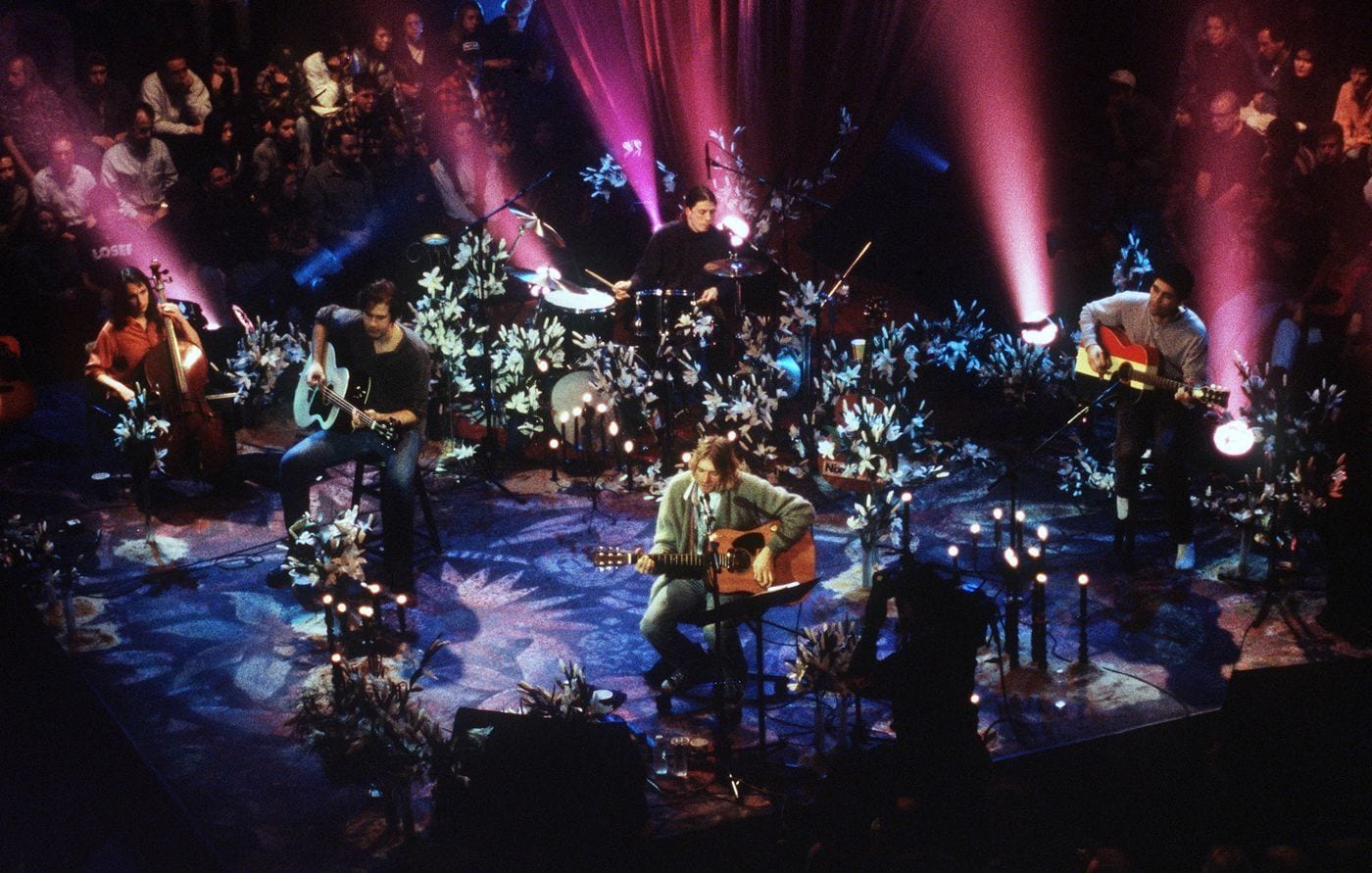
Looking back on the phenomenon that was MTV’s Unplugged series in the 1990s, Nirvana’s Unplugged set was atypical for many reasons: not just for the quality of the band’s work, but for the exceptional rawness despite the sometimes-subdued musical setting.
In fact, for those who came from a punk angle, the album was far rawer than the average live acoustic album that was popular at the time. For those of us who got into Nirvana from outside of punk, MTV Unplugged in New York was a gateway to Kurt Cobain’s genius and madness. In either sense, the album should be considered a classic.
Recorded in late 1993, less than two years after their landmark album, Nevermind, reached #1 on the Billboard album charts, and achieving notoriety as leader Kurt Cobain’s epitaph after his suicide months after the concert’s recording, Nirvana’s MTV Unplugged in New York is back for a 25th anniversary reissue. Are the new rehearsal tracks enough to justify repurchasing the album?
Yes and no—both because of the takes’ raggedness. They don’t enhance the quality of the original album, and yet, they humanize Cobain and the band because of their imperfection compared to the somewhat more polished concert performances.
The original album holds up. It’s beautiful in its simultaneous messiness and melodic sheen. Beyond the acoustic instrumentation, little about this album is gentle—the rawness of the performances is a testament to the depth of Nirvana’s rock spirit amid the quieter atmosphere.
The acoustic setting brings out the more melodic side of Cobain’s guitar playing on songs like “About a Girl”, but also the strain in his vocals on songs like “Come as You Are”. His voice sounds soaked in cigarettes and alcohol, and, of course, the poignancy of him singing, “And I swear that I don’t have a gun” remains sharp a quarter-century after his suicide and the album’s release.
The album’s lack of hits and abundance of mostly obscure covers may have helped make this album a favorite among rock critics looking for something unpredictable. The especially haunting takes on David Bowie’s “The Man Who Sold the World” and Lead Belly’s “Where Did You Sleep Last Night” (aka “In the Pines”) have proven among Cobain’s most durable, passionate, and transcendent performances. To this day, the angst is easily palpable, listening to Cobain wail through “Where Did You Sleep Last Night”.
This album is so good that, to my ears, the strong covers of the Meat Puppets’ “Plateau” and “Oh Me”, featuring members of the Meat Puppets, in the original album’s second half might be the low point of the record. The version of that band’s “Lake of Fire”, however, proves especially haunting in light of Cobain’s death.
The record sounds unusually intimate, and the rehearsal takes add to that intimacy. Rawer than the in-concert versions, these takes do show some polish and precision, but they, of course, show the progress in getting to the Unplugged show rather than the finished product. That’s double-edged: while they don’t add to the quality of the original album, they give a solid reminder of the live quality of this band and what made them special.
Before the band plays “Plateau”, Dave Grohl even goes into a funky drum break, further confirming his versatility as a drummer and musician. The strength of the instrumentation, arrangements, and band interplay sometimes go unremarked in this album, and the cello on tracks like the concert versions of “Dumb”, “Polly”, and “Something in the Way” especially enhances the melancholy and pathos in the songs.
Among the rehearsal takes, there’s also a version of “Pennyroyal Tea” from before the band decided to use it as a solo acoustic vehicle for Cobain. So hearing backing vocals and bass on it might sound strange to those accustomed to the concert version, but it still sounds like a fresh rendering. The rehearsal take of “The Man Who Sold the World” is strong, but except for a more gritty, knotted vocal from Cobain, it doesn’t add to the in-concert version.
Looking back on the album, both the depression and the sarcastic wit undercut the music and the interactions between tracks. It’s impossible to listen to this album today and not think of Cobain’s death when you hear the sardonic comments like, “Shut up,” responding to “That sounded good.”
But when you listen to the rehearsal takes, it’s refreshing to hear a band sound so alive to those who might be overfamiliar with this album or Nirvana’s output in general. To new listeners, however, the rehearsals won’t add much.
- Rebels Wit Attitude: Nirvana - PopMatters
- The Best Ever Nirvana Recording 'In Utero' Celebrates Its 20th ...
- Between the Grooves of Nirvana's 'Nevermind' - PopMatters
- Nirvana: Live at Reading - PopMatters
- Legacy and Oblivion: 25 Years of Nirvana's 'Nevermind' - PopMatters
- No Recess: The Heaviest Nirvana Mixtape - PopMatters
- Rock 'n' Roll with Chinese Characteristics: Nirvana Behind the Great ...
- I Found My Friends: The Oral History of Nirvana - PopMatters
- 'I Found My Friends' Is a Drop in the Bucket of the Nirvana Story ...
- Between the Grooves of Nirvana's 'Nevermind' - PopMatters

